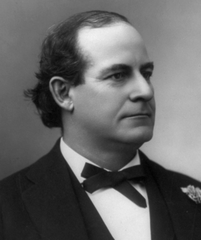
Continuing my desultory study of Clarence Darrow, I read Donald McRae’s The Last Trials of Clarence Darrow (2009) over the past weekend. As the title suggests, McRae focuses on Darrow’s later career, including not only the Scopes trial but also the Leopold and Loeb case (in which Darrow successfully argued against the death penalty for the teenage murderers Nathan Leopold and Richard Loeb) and the Sweet case (in which Darrow secured first a hung jury and then acquittal for a group of blacks accused of murder after shots were fired into a racist mob menacing them in their new house in Detroit). It was a enjoyable book, not least because it prompted me to revisit, and research, a 1923 clash between Darrow and William Jennings Bryan that prefigured their duel during the Scopes trial when Bryan took the stand to testify.
Any choice about where to begin the story is perhaps arbitrary, but a report in the June 4, 1923, Chicago Daily Tribune provides a plausible start. The report concerns Henry Van Dyke, a Presbyterian pastor in New York with harsh words for his fellow Presbyterian William Jennings Bryan—whom he was reluctant to name, calling him “the gentleman from Florida, late from Nebraska.” Van Dyke complained of Bryan’s recent attempts to impose his views on the Presbyterian General Assembly, in particular his proposals to require “five new tests of orthodoxy,” to impose a pledge of total abstinence from wine (and presumably alcoholic beverages in general), and his declaration of “war between religion and science by denouncing and condemning the evolutionary hypothesis of man’s physical nature as ant[i]-scriptural and atheistic.”
Doubtless recalling the story, the newspaper’s editorialist linked the themes of abstinence and antievolutionism on June 10, 1923. “Mr. Bryan, being frequently intoxicated by his own ideas, has no use for wine,” the editorial quipped. “It is immoral to deny that the world was made in six days and it is immoral for grapes to ferment. He is pained because he has not got the six day opinion written into the constitution of the United States, but he is glad that he has the grape opinion written there.” (The Eighteenth Amendment, which Bryan supported, established Prohibition in the United States. Bryan at least contemplated the possibility of a constitutional amendment to prohibit the teaching of evolution, according to a report in The New York Times for July 8, 1925, though he later disavowed wanting a constitutional amendment to require the teaching of the Bible.)
On June 20, 1923, the Daily Tribune printed a letter from Bryan, dated June 14, 1923, from Miami, responding to the editorial about his beliefs about the interpretation of the Bible. “[Y]ou have not in a single instance stated them correctly,” Bryan complained. With regard to evolution, he cited the antievolution resolution recently adopted (with his encouragement) by the Florida legislature, describing the teaching of “Darwinism, or any other hypothesis that links man in blood relationship to any other form of life” as “improper and subversive,” as reflecting his views. “Please note that the objection is not to the teaching of the evolutionary hypothesis as an hypothesis, but to teaching of it as true or as a proven fact,” he added: the old pseudo-Baconian “theory not fact” theme was as alive and well in 1923 as it is today.
Bryan’s letter was all the cue that his old foe Darrow needed. The Daily Tribune printed a long letter from him on July 4, 1923, in which he grilled Bryan about the Bible and science. “There were fifty-five queries in total,” McRae oberves, “ranging from the serious to the comic and back again.” They were organized under several headings, whether supplied by Darrow or the newspaper: Creation of the Earth, Garden of Eden, What About Flood?, Ararat and the Rainbow, and Joshua and the Sun (alluding to the claim that the Sun stood still at the behest of Joshua). Darrow’s concluding two questions for Bryan: “Can one not be a Christian without believing in the literal truth of the narrations of the Bible here mentioned? Would you forbid the public schools from teaching anything in conflict with the literal statement referred to?”
How did Bryan respond? In the July 5, 1923, issue of the Daily Tribune, the Reverend W. B. Norton reported that when Bryan arrived at a “Christian citizenship conference” held on July 4, 1923, in Winona Lake, Indiana, he was shown Darrow’s questions and asked to comment. Bryan replied that he didn’t need to bother reading the questions to answer: “I know Mr. Darrow’s attitude towards religion and I can give you an interview before reading his questions as well as after.” And his comments in the interview that he granted were aimed not at Darrow (“one of two atheists with whom I am acquainted”) but at theistic evolution: “an anesthetic which deadens pain while religion is being removed.” “I decline,” he stated, “to turn aside to enter into controversy with those who reject the Bible as Mr. Darrow does.”
That was a mistake. For two years later, when Arthur Garfield Hays called Bryan to testify the stand in Dayton, Darrow was ready with his questions from 1923, while Bryan was not always prepared with his answers. The most famous example of Bryan’s lack of preparation involved either the date of Noah’s flood or the creation of humans—it isn’t clear from the transcript that Darrow and Bryan were on the same page. In any case, whatever he conceived the topic to be, Darrow asked Bryan to venture a guess on it: “What do you think?” Bryan answered, “I do not think about things I don’t think about.” By now openly derisive, Darrow asked, “Do you think about things you do think about?” And Bryan unwisely replied, “Well, sometimes.” At that, there was laughter in the court, and a subsequent call for order.

